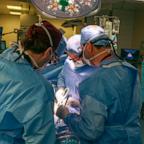Recession Takes Toll on Children's Health
July 18 -- FRIDAY, July 17 (HealthDay News) -- The recession is taking a toll on many U.S. children, especially the poor and uninsured, according to a survey of 1,471 parents and their children.
The poll, conducted in the United States last May, found that 44 percent of families' financial circumstances worsened in the previous six months, forcing them to spend less on extras (65 percent), apply for government health coverage (24 percent), apply for free or reduced lunch programs (27 percent), and delay taking their children to the doctor (11 percent) or dentist (16 percent).
"In particular, we found that if a family's financial situation had worsened over the last six months and their children were uninsured, 40 percent of those parents had delayed taking their children to the doctor," said Dr. Matthew Davis, director of the C.S. Mott Children's Hospital National Poll on Children's Health.
"This is a particularly concerning statistic when we consider that some of these kids whose care is being delayed may be particularly vulnerable or at risk for serious health problems," Davis said in a news release.
Forty percent of parents said their children aged 5 to 17 were experiencing stress because of their family's financial problems, the poll found. Abdominal pain, headaches and acting out are symptoms of stress in children, the study authors noted.
"We found that stress from financial worries affected families of lower incomes more than families of higher incomes," Davis said. "Families of the lowest income level -- namely making $30,000 per year or less -- were more than twice as likely to report their kids had stress as families of the highest income group making $100,000 or more per year," he said.
The findings show that "this recession is not an equal opportunity recession," Davis said. "It has affected families across all income levels and range of vulnerability, but it is affecting those who are most vulnerable even more than the population as a whole. If you don't have insurance, or if your family income is at a lower level, your children are likely to be even at higher risk as this recession drags on."




